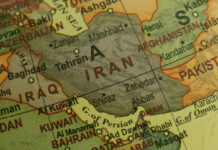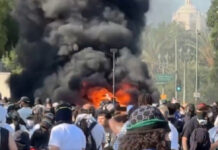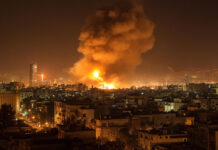It looks like war between Iran and Israel may flare from an occasional restrained attack between the two foes to a much wider war.
Iran has been threatening a massive reprisal for Israel’s recent attack, the latest in a tit-for-tat spat that goes back and forth over the past couple of months. The U.S. has warned Iran that it will not restrain Israel if Iran attacks again, meaning that Israel could launch attacks targeting Iran’s oil assets and/or potential nuclear targets. Should that happen, it could have global implications.
Besides its usual naval assets, the U.S. recently moved B-2 bombers closer to the Middle East. This could be considered a reminder that if Iran attacks, Israel may not be alone in its response. The U.S. bombers could carry a nuclear payload or bunker busting bombs designed to take out underground shelters.
Israel’s last attack supposedly knocked out multiple Russian supplied anti-aircraft missile batteries. If so, this would allow Israel (and possibly the U.S.) to attack with aircraft with fewer concerns about being shot down. (Data to back up Israeli claims is scarce and not everyone believes the claims.)
Iran is telegraphing its attack and has already warned that it will close its airspace the day after the U.S. election. I think it would be effective if Israel were to launch an immediate counterattack instead of waiting weeks to respond. A rapid counterstrike would not only prevent Iran from celebrating its attack, it would drive home the immediate cost of attacking Israel and would give Israel the upper hand.
Global Disorder
If a brief war breaks out between Iran and Israel, it will have little impact on the world. However, if a war drags out or involves more countries, or if anyone puts boots on the ground, that could have a major impact around the world.
From an economic standpoint, an attack on Iran’s oil assets would drive up the cost of oil, which will be exacerbated further if they attack ships in the Strait of Hormuz. While the U.S. has a good supply of oil and an excess of natural gas, any disruption could be bad for Europe and China (which buy oil and gas on the open market) and good for Russia, which sells oil, often under the table. Domestically, we would see some price increases, but it would be worse in countries that have little or no domestic production.
Iran may hope that Russia will come to its rescue, but Russia is even less capable of fighting on multiple fronts than is the U.S. It has its hands full in Ukraine and is counting on Iran and North Korea to supply Russia with weapons and soldiers, not the other way around.
Regardless of who wins the presidency (and this is being written before the race is called), an active shooting war in the Middle East would complicate the transition. While the Democrats have supported Israel in its war with Hamas and now Hezbollah, this has turned many young leftists against Biden and Harris. A full-fledged war could result in protests against Biden and/or Harris, resulting in even more social and political strife.
How to Prep for it
The most obvious prep is to fill your gas tanks, fuel cans, and take care of any other energy needs before a Middle East war drives up the price of energy. Have enough cash on hand and in your investment accounts to withstand minor financial hiccups as markets react. You don’t want to be forced to sell something if the market dips.
Otherwise, the preps you (should) have already made to prepare for the possibility of post-election violence should serve you well if there are domestic repercussions to a Middle East war. Unless, of course, someone uses nuclear weapons, in which case the result will be far worse than hiccups.
The big unknown is whether Iran has nuclear weapons and, if they do, whether they will be desperate enough to use them. Because the Iranian government is led—or at least guided—by religious fanatics, it is more likely they would use nuclear weapons in a conflict with Israel than it is that Russia would use nukes in Ukraine. (Note that I didn’t say NATO; that’s a separate issue and a different calculus.)
The use of even a single nuclear weapon (and using only one is unlikely) would cause immediate panic among the populace of most first-world countries. I’m talking about the kind of panic that strips store shelves in hours, causes a bank run, and results in a stock market selloff that causes the exchanges to halt trading and the government to declare a bank holiday. Even a nuclear exchange that doesn’t kill a single American will have an immediate negative impact on life as we know it. You should be prepared for the fear, doubt, anger, and market turmoil caused by a nuclear war, just in case.
Nuclear Weapons in the Middle East
We know Israel has nuclear weapons; we know Iran has the technology, but may not yet have produced any. However, when a country calls for the annihilation of another and expresses a desire for nukes, we must consider the possibility that they may use them. This is why war between Israel and Iran is so dangerous and why we, as preppers, must monitor it.
It’s important to remember that if nuclear weapons are used in the Middle East, they pose no immediate danger to the United States. Eventually, some fallout would reach us, but how much depends on the weather patterns, the size and number of devices used, and whether they were air bursts. If there is a nuclear exchange between Israel and Iran, follow the advice of our post “What to Do if Nuclear War Breaks Out” and don’t panic.
Speaking of panic, refer to my recent post on “top off preps” you can do at the last minute. Not all may apply in this scenario, but it gives you an idea of what to think about.
The greatest danger, in my opinion, is not what nuclear war will do to oil prices—which will be both immediate and extreme—or the financial markets, but the use of nuclear weapons will make it more likely another country would turn to nukes once the genie is out of the bottle. This may be a longer-term threat, but just as the world changed for the worse when we used the dollar and the SWIFT system as a weapon instead of a world currency, the use of nuclear weapons for the first time in 70 years would have long-lasting negative effects.
Stay Prepped
The prospect of a wider war in the Middle East, most likely a conventional war not a nuclear one, is but one of the many issues we need to prep for. For example, another hurricane is brewing in the Caribbean and may strike Louisiana. As the presidential election draws to a close, we must also be aware of the possibility that there will be protests, looting, and violence may break out in the days and weeks ahead.
Stay safe and keep your head on a swivel.








